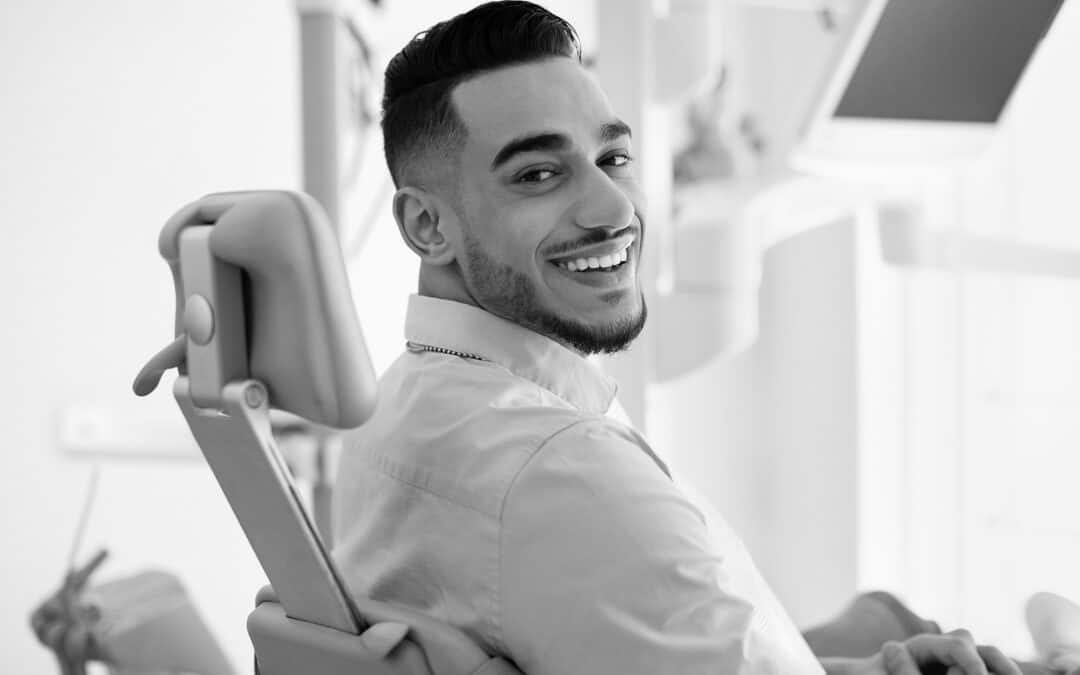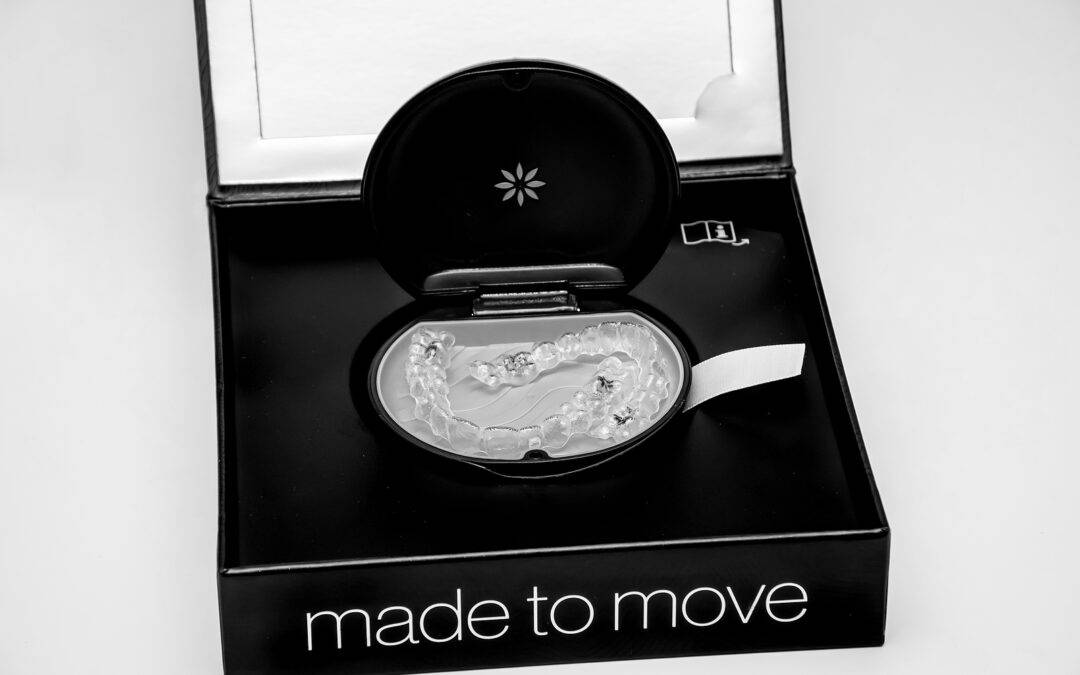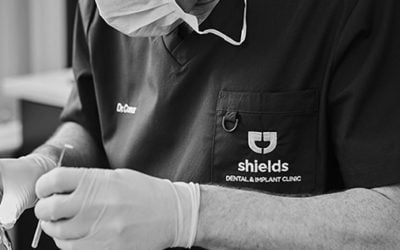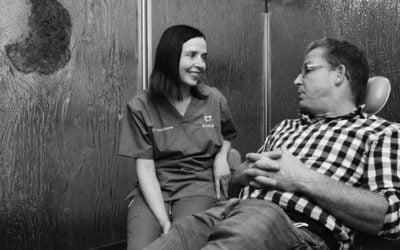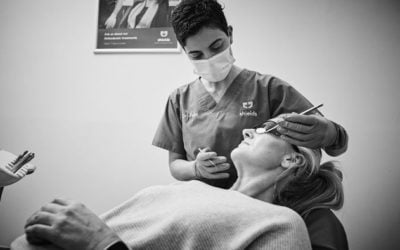Can you ever feel 100% comfortable in the dentist’s chair? We’re sure that most people would say no. In fact, the Irish Dental Association statistics reveal that 20% of the Irish population suffer from fear or anxiety when visiting the dentist. Our greatest worry is when patients avoid visiting the dentist altogether, which can disastrously affect their oral health.
Modern dentistry methods, such as Sedation Therapy, are now available to ensure a more comfortable experience at the dentist. After one of our dentists delivers sedation, you’ll feel more relaxed during treatment. But don’t worry–you’ll still be conscious and responsive.
Not all dental practices offer IV sedation dentistry to their patients. The best way to find out if they do is to check their website beforehand or contact the reception team. At Shields Dental & Orthodontic Clinic, patient care and comfort are our top priorities. That’s why our dentists have untaken extensive training and qualifications, so nervous patients can feel relaxed in our care.
If you’re scheduled to undergo treatment and would feel calmer under sedation, contact us here.
Is Sedation Dentistry Right for You?
Sedation dentistry can support those who experience anxiety or discomfort when visiting the dentist. We also recommend it for those who struggle to keep still through lengthy procedures, have extreme tooth sensitivity, a sensitive gag reflex or limited mouth movement.
Dentophobia:
IV sedation therapy is an essential tool for our Dentophobic patients. Most cases of Dentophobia stem from an adverse childhood experience at the dentist or memories of outdated equipment and procedures. However, modern dentistry has progressed immensely, and we now deliver pain-free methods.
From years of avoiding the dentist, anxious patients may need extensive corrective treatment to reverse the damage–this can be the worst news for those with Dentophobia. However, one positive experience under sedation may be all you need to overcome the fear.
How Does Sedation Therapy Work?
Sedation dentistry can help our patients in three ways:
Anxiolytic: Relieves anxiety.
Sedative: Calms and induces sleepiness.
Amnesic: Memory Loss.
Sedation Types:
There are four different levels of sedation based on strength and side effects.
1) Minimal Sedation: Minimal sedation means you are awake but feel relaxed. You’ll be able to talk normally and will likely remember having treatment, just not all the details. Examples of this sedation are ‘laughing gas’ or ‘oral sedation.’
2) Moderate Sedation: Moderate sedation was formerly called “Conscious Sedation”. As suggested, you are still awake but may slur your words or not remember much of the procedure. An example of this is ‘IV sedation.’
3) Deep Sedation: Deep sedation means you are on the edge of consciousness, but we can still wake you. You’re unlikely to remember much of your treatment, and your breathing will slow. Our dentists will monitor you throughout treatment.
4) General Anaesthesia: General Anaesthesia means you are unconscious during the procedure.
What Sedation Do We Offer Our Patients?
At Shields, we offer three different types of sedation dentistry to our patients. The strongest sedation we offer our patients is (IV) sedation. However, we also have nitrous oxide and oral sedation if you’re afraid of needles.
- Nitrous Oxide, or “laughing gas”, is inhaled via a nose mask. Nitrous Oxide falls under minimal sedation, so you’ll need to inhale it continuously throughout treatment. Our dentists control the amount of gas you receive, which tends to wear off quickly. Once your treatment is over, a dentist will give you pure oxygen to flush out the nitrous oxide in your system. There are minimal side effects to this sedation.
- Oral Sedation is a pill taken the night before or the morning of treatment. Most dentists use triazolam (Halcion®) in the diazepam (Valium®) family. Oral sedation is targeted more at those who experience anxiety rather than discomfort. The pill will make you drowsy, but it is still minimal sedation. If you fall asleep, we can wake you with a slight touch. You’ll need a guardian to drive you home afterwards.
- Intravenous (IV) Sedation is the deepest form of sedation we offer, delivered through a cannula (drip) into a vein in the patient’s arm or the back of their hand. A dentist will monitor your heart rate, blood pressure, and oxygen levels during the procedure. IV sedation is the best option for those suffering from dental anxiety or undergoing lengthy procedures.
The type of sedation you’ll receive will rely on your preferences and suitability. You must request sedation before any scheduled treatment so we can do a thorough health assessment.
How Can Sedation Dentistry Help You?
- Sedation dentistry helps you relax and makes treatment more comfortable.
- It relieves anxiety without rendering you unconscious.
- If you struggle to remain still, sedation can assist us in a quicker and more effective dental treatment.
- Sedation dentistry can reverse Dentophobia as it offers an amnesic effect. In fact, you may not remember treatment at all.
- Sedation carries fewer side effects than a general anaesthetic.
- You will be fully monitored throughout treatment when under IV sedation. We will only discharge you once you’ve made a good recovery. However, recovery is often quicker than general anaesthetic, which means you can leave within an hour or two of treatment.
How to Prepare for Sedation Dentistry?
- Wear loose clothing
- Eat a light meal a few hours before treatment
- You must be escorted by a competent guardian who will remain at the practice during treatment. IV sedation can cause headaches, dizziness and nausea. For this reason, an escort is non-negotiable. Patients not accompanied by a guardian will not be treated and will lose their deposit.
Can Any Dentist Provide Sedation Therapy?
Most dentists can provide minimal sedation (Nitrous oxide or pills). However, those who give (IV) sedation must be trained and accredited in Conscious Sedation.
Conor Shields has a wealth of expertise in sedation, including 15 years of experience in providing sedation to patients, coupled with his postgraduate training (Diploma in Conscious Sedation, Guys Hospital, 1997).
Interested in Sedation Dentistry Near You? Contact us at Shields Dental & Orthodontic Clinic in Limerick & Blackrock.
If you are scheduled to undergo dental treatment but are concerned about your emotional or physical ability to go through it without sedation, contact our friendly reception team at 061 539028. Our reception team will book you in for an assessment, where our dentists will decide which sedation treatment is most suitable for you. You can also book online here.


